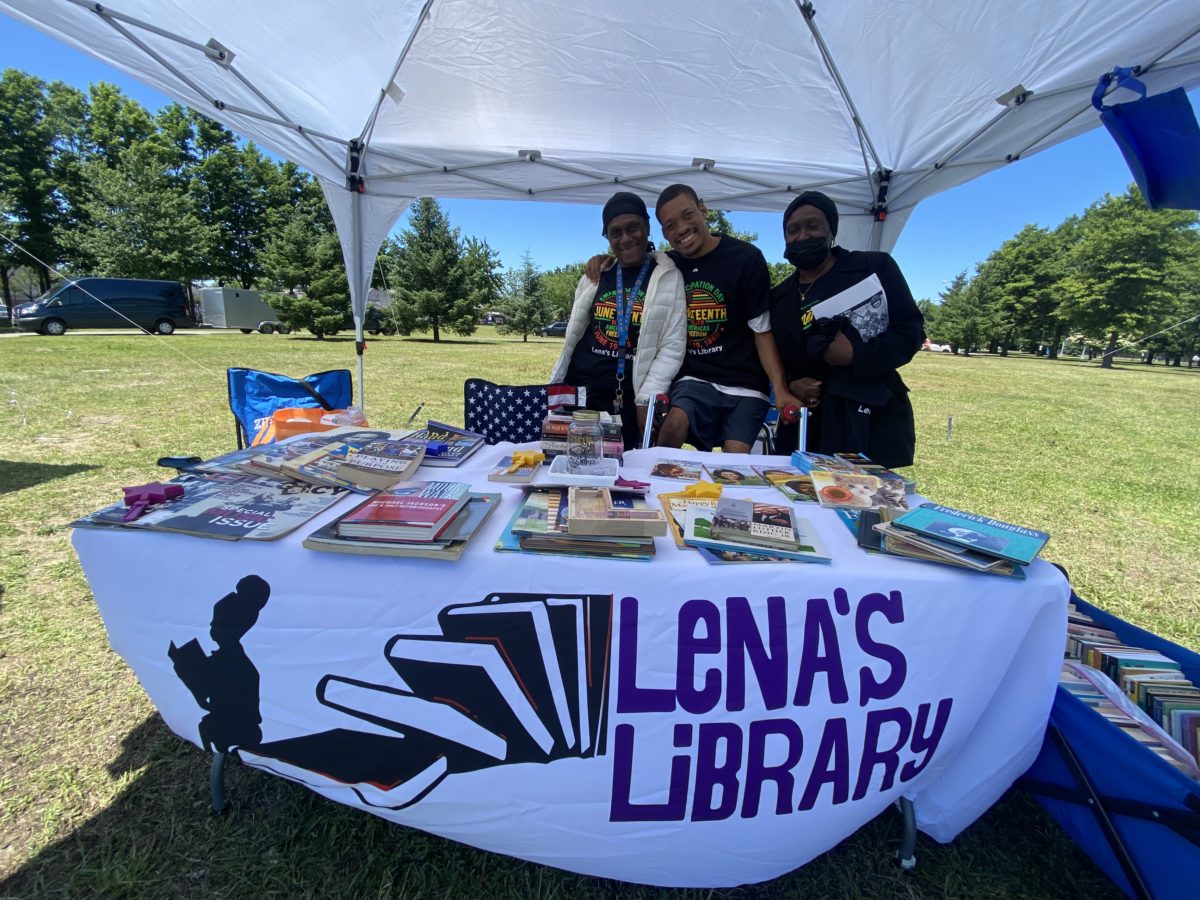Juneteenth in Queens celebrated at Roy Wilkins Park
Juneteenth—the newest federally recognized holiday—originated on June 19, 1865, when Union Army general Gordon Granger proclaimed freedom for the enslaved African-American people in Texas.
More than 150 years since it began, the holiday gained national recognition in 2021, when President Joe Biden signed the Juneteenth National Independence Day Act into law, making it the first nationally recognized holiday since Martin Luther King Jr. Day was adopted in 1983.
For the second year in a row, the borough held its “Juneteenth in Queens” event at Roy Wilkins Park in St. Albans, a day-long celebration including over 100 vendors on-hand and live musical performances.
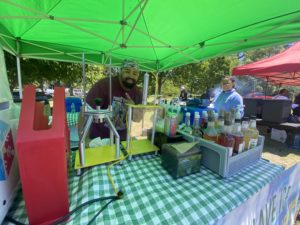
Pon Di Ice, a Jamaica-based business at the Juneteenth in Queens event at Roy Wilkins Park.
A lineup made up of The Goode Dance Project NYC, Nadia Renee, Chad Milner, Supe, Devore Dance Center, Ralph McDaniels & Friends, Neveah Flowers, Cash Sinatra, Isaac Sawyer, TGIFLY, Riflette Cheerleaders, Black Spectrum Theatre, the Bartlett Brothers and Michael Pugh performed for the liberating event on Saturday.
The day is nothing new to Sophia K-Franklin, who helped hand out free books from the vendor tent of Lena’s Library, a southeast-Queens based literary initiative that lends out books for free.
Sophia’s daughter, Lena, helps run the library, which also serves as a place of occupation for special-needs adults.
With dozens of books and magazines about Black history and prominent Black figures on display underneath their festival tent, Lena’s mother emphasized the importance of promoting literacy one book at a time.
“Don’t leave it for somebody to tell you, because they’re going to tell you their version. You read it so you can tell your own version,” K-Franklin said. “This day finally acknowledges that we were slaves and we were freed. And we have to live in a state of being free. Because you can be free and not ‘free’.”
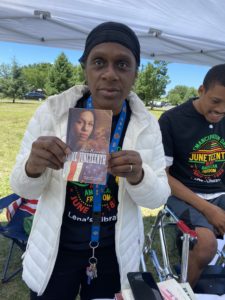
Sophia K-Franklin highlights the importance of literacy and Black history at the Juneteenth in Queens event at Roy Wilkins Park.
The southeast Queens mom’s message was echoed by a number of elected speakers, including Assemblywoman Alicia Hyndman and State Senator James Sanders Jr.
“It’s not just a day off for our kids,” Hyndman said to the crowd at Roy Wilkins park. “Let’s remember that it’s not just a day off work because there was a time when you had no days off.”
Sanders noted that even after the 1860’s, an era of sharecropping slavery was introduced until Black people were given the right to vote with the passage of the Voting Rights Act in 1965.
“Since then, we’ve entered into a type of wage slavery,” Sanders said. “Now comes a time where we have to have a revolution of the mind, where we have to liberate ourselves from a type of wage slavery.”
He questioned the crowd of how much of southeast Queens is owned by the Black community.
“How many of the stores do we own? I would argue not enough,” he added.
Sponsors for the second annual event included E.W.G. Glass Recycle Corp., NHSJ American Recycling Management LLC., Resort World Casino, UPS, ELMCOR, Black Spectrum Theatre Co. Inc,. A Whole New JFK, VOYCE, NYC Parks, Dr Bronner’s, KAAGNY, Lyft, Greater Jamaica Development Corp., REBNY, EmblemHeath, HNTB, Patrick B. Jenkins & Associates, Life Camp, Mercury, 100 Suits, Queens Chamber of Commerce, NYC Office for the Prevention of Hate Crimes, NYSABPRL, NYC Human Rights, conEdison, NYC Vicinity District Council of Carpenters and SEQ U.P. Front.
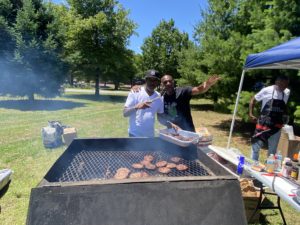
Food vendors manned the grill at the Juneteenth in Queens event at Roy Wilkins Park.
As a Black History major, K-Franklin also celebrates Black Solidarity Day, normally celebrated on the first Monday in November as a reminder of the collective strength of the Black community.
She acknowledged that with federal recognition of Juneteenth, it’s only natural for the commercialization of the new holiday to follow.
“You’ve got to celebrate yourself everyday,” K-Franklin said. “Don’t wait for the government or commercial media.”
It’s the celebration of culture and giving back to the community, she says, that should be prioritized before capitalizing and profiting on the day.
“We don’t need to be going shopping,” she said. “But we’re not going to get away from it because anybody will use the opportunity to make a buck, but do the right thing with it.”
“We gotta be careful we don’t get used, and the commercial takes us over. That’s what we don’t want.”
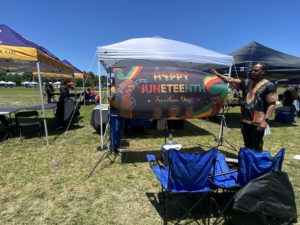
A Juneteenth flag flies at the Juneteenth in Queens event at Roy Wilkins Park.
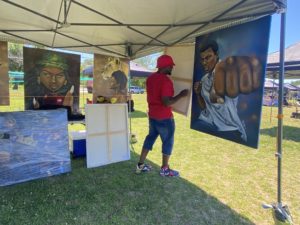
Vendors displayed their artwork at the Juneteenth in Queens event at Roy Wilkins Park.
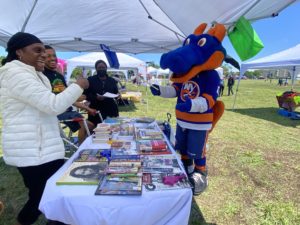
Lena’s Library is visited by the mascot of the New York Islanders, Sparky the Dragon.
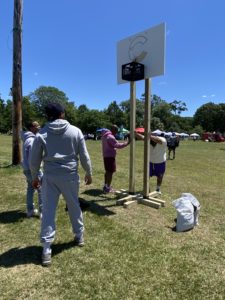
A makeshift basketball hoop set up at the Juneteenth in Queens event at Roy Wilkins Park.



